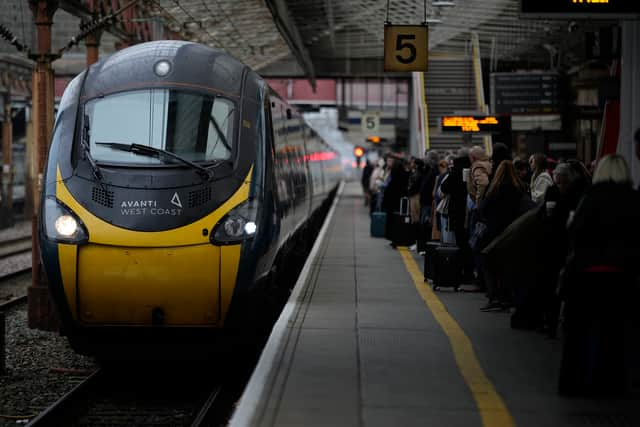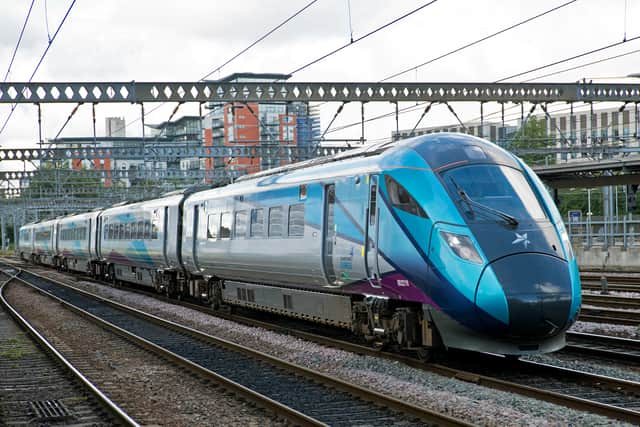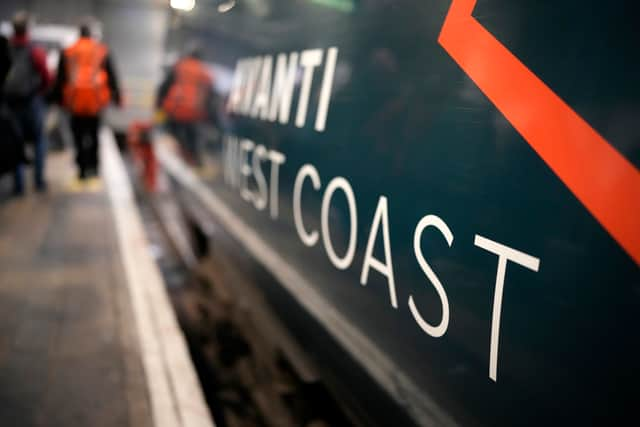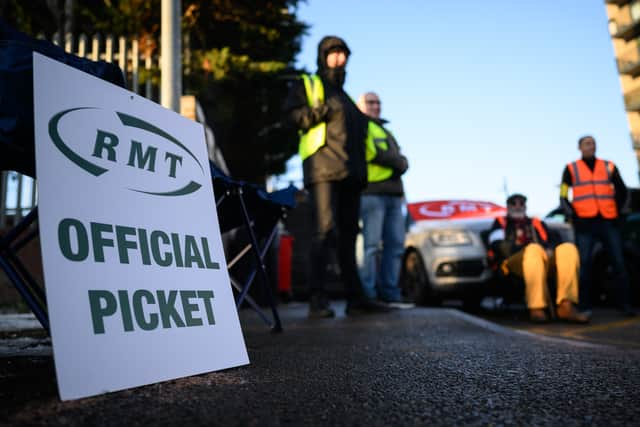RMT & Aslef rail strikes to resume - Passengers warned travel only if “absolutely necessary” - dates affected
and live on Freeview channel 276
As the Christmas festivities are over for another year, people will be thinking about returning to normality, and of course, that means…work. However, if you usually catch a train into the office, you might want to take a look at your local train schedule as strikes are due to commence this week.
After six months of rail strikes, the two biggest rail unions, RMT and Aslef have planned to stop work for a total of five days at the start of 2023 as discussions about pay and conditions continue. The rail strikes coincide with people returning to work and school after the new year, with only 20 percent of trains expected to run.
Advertisement
Hide AdAdvertisement
Hide Ad40,000 members of the RMT union working for Network Rail and 14 train operators are expected to walk out for 48 hours on Tuesday and Wednesday (January 3-4), and again on Friday and Saturday (January 6-7). On Thursday (January 5), thousands of train drivers belonging to the Aslef union who work for 15 train operators will strike.
Tricia Williams, chief operating officer at Northern, said: “This is a most regrettable start to 2023 and we can only apologise to our customers whose return to work from the holidays will be disrupted by the action by the RMT and ASLEF.
“We’re encouraging everyone to use the new ‘Check My Timetable’ feature on our website to see the changes specific to their local station.”
The unions say they want a fair pay rise, assurances on job retention and no changes to working conditions without negotiation. It is thought that only 20 per cent of services will operate as normal on strike days, and it is advised that travellers check their route before heading out.


Trains strikes January 3-4
London North Eastern Railway/Lumo/Grand Central/Hull Trains
Advertisement
Hide AdAdvertisement
Hide AdLNER, the flagship operator on the East Coast main line, is planning its timetable on its core route between London King’s Cross, York, Newcastle and Edinburgh – with eight departures between the English and Scottish capitals between 7.27am and 12.30pm. Additional trains will serve York and Newcastle.
No LNER trains will run north or west of Edinburgh in Scotland.
Eight LNER trains each way will connect London King’s Cross with Leeds.
Lumo, which competes between London and Edinburgh, will run two trains during each strike day.
Advertisement
Hide AdAdvertisement
Hide AdGrand Central, another “open-access” operator, will run twice daily between London, Doncaster and Wakefield, and three times between Northallerton, York and London.
Hull Trains, which normally links the Humberside city with London via Doncaster and Grantham, will run only London-Doncaster.
It says: “We are providing buses for Hull and Brough passengers and taxis for Howden and Selby passengers to connect onto Hull Trains rail services starting in Doncaster.”
ScotRail
The national operator will be running a strike timetable right through the week, with a very limited service based around and between Edinburgh and Glasgow (which are connected by two fast trains an hour via Falkirk High). Other stations on the network: Helensburgh, Hamilton, Larkhall, Lanark, Shotts, Cowdenbeath, North Berwick, Tweedbank, Larbert, Milngavie and Springburn. Mostly they will be served by two trains an hour.
TransPennine Express/Northern
Advertisement
Hide AdAdvertisement
Hide AdThese train operators have overlapping networks, so both are combined here.
A basic Liverpool-Manchester Piccadilly-Manchester airport service will operate on the west side of the Pennines. On the east side, links from Leeds will run to Selby, York, Ilkley, Skipton, Bradford, Doncaster and Sheffield.
TransPennine Express will have a service on three lines on: Sheffield-Cleethorpes, Manchester Piccadilly-Huddersfield-Leeds-York and Preston-Manchester Airport. The pattern on January 6-7 is the same except the Manchester-Huddersfield link will not run.


Great Northern
Two trains an hour between London King’s Cross and both Peterborough and Cambridge,
with different stopping patterns.
South Western Railway
Advertisement
Hide AdAdvertisement
Hide AdFour trains per hour from London Waterloo to Windsor, Woking and Basingstoke, with two trains each hour continuing to Winchester and Southampton (via the airport).
Great Western Railway
GWR will run hourly trains to and from London Paddington on its key lines to Cardiff and Bristol Temple Meads, extended every other hour to Taunton, Exeter and Plymouth.
Oxford will also be served from Paddington.
The Cardiff-Westbury line (via Bristol and Bath) will see trains, as will Slough-Windsor, Maidenhead-Marlow, Twyford-Henley and Reading-Basingstoke.
The Night Riviera sleeper service will not run on any strike night, nor the intervening days between 48-hour walk-outs. The first evening it is planned to operate is Sunday (January 8).
Transport for Wales
Advertisement
Hide AdAdvertisement
Hide AdThe national operator says: “The majority of rail services across the Wales and Borders network will be suspended on January 3-4 and 6-7.
“Transport for Wales is not involved in the industrial action. However, the industrial action resulting from the dispute between the unions and Network Rail means we’ll be unable to operate rail services on Network Rail infrastructure,” the rail provider explained.
The only services will connect Cardiff with the Valleys – Treherbert, Aberdare, Merthyr Tydfil and Rhymney – and a shuttle to Newport and back.
CrossCountry
From the hub at Birmingham New Street there will be one train an hour on most of the key routes: Bournemouth via Reading and Southampton; Leeds, York, Newcastle and Edinburgh (though the service is sparse and finishing earlier, the further north you go); Leicester; and Manchester via Wolverhampton and Stafford.
Chiltern Railways
Advertisement
Hide AdAdvertisement
Hide AdThe entire Midlands network north of Banbury is closed up to and including Sunday (January 8) inclusive.
In the southern part, there will be hourly trains linking London Marylebone with Oxford Parkway, Banbury and Aylesbury (via both High Wycombe and Amersham).
Avanti West Coast
“We plan to run one train per hour from Euston to each of Manchester, Liverpool, Birmingham and Preston,” the operator said.
“North Wales, Shrewsbury, Blackpool and Edinburgh have no Avanti West Coast services, and trains will not be calling at Stockport, Macclesfield, Stoke-on-Trent or Runcorn, so these stations will be closed.”
Advertisement
Hide AdAdvertisement
Hide AdSome trains will extend north of Preston to Lancaster and Carlisle, but flooding has closed the line into Scotland. The first trains will run from around 8am or 9am, and the last trains will depart London Euston for Manchester at 3.40pm, for Liverpool at 3.56pm and for Birmingham at 4.23pm.


West Midlands Railway/London Northwestern Railway
Trains linking Birmingham New Street with Lichfield Trent Valley, Redditch, Bromsgrove, Wolverhampton, Crewe, Northampton and London Euston (the latter more cheaply than Avanti West Coast).
East Midlands Railway
Hourly links from both Sheffield and Nottingham to London St Pancras, giving a twice-hourly service from Leicester.
Trains will also run hourly between Corby and London St Pancras, Derby and Matlock, Derby and Nottingham, Sheffield and Nottingham, and Leicester and Nottingham.
Thameslink
Advertisement
Hide AdAdvertisement
Hide AdTrains every half-hour from London St Pancras to Bedford via Luton airport, with additional stopping services from the capital to Luton.
Southeastern
Some routes will operate to/from London between 7am and 6pm: the High Speed 1 line from London to Ashford and suburban trains to Dartford (via both Bexleyheath and Sidcup) and Sevenoaks.
Southern


Trains every half-hour from both London Victoria and London Bridge to Brighton via Gatwick Airport, with a shuttle running between Brighton and Hove.
Some south London suburban trains will run, with links to Epsom Downs and Tattenham Corner in Surrey.
What trains are running on Thursday, January 5?
Advertisement
Hide AdAdvertisement
Hide AdTrain drivers belonging to the Aslef union will walk out on Thursday (January 5) for the sixth day in the current dispute.
The following train operators will be affected: Avanti West Coast, Chiltern Railways, CrossCountry, East Midlands Railway, Greater Anglia, Great Northern, Thameslink, LNER, Northern, Southeastern and TransPennine Express.
Although Aslef is not in dispute with ScotRail, the national operator is keeping the same limited schedule in place all week, including Thursday when the RMT strike is not happening. Of the companies that say they are running a service, Great Western Railway will shuttle between London Paddington and Bristol Temple Meads, with links from Reading running to Oxford and Basingstoke.
Lumo has three trains each way between London and Edinburgh. Also on the East Coast main line, Grand Central and Hull Trains will run a near-normal service, with some trains curtailed at the start and end of the day.
Which trains are cancelled on Friday and Saturday, January 6-7?
Advertisement
Hide AdAdvertisement
Hide AdThe RMT action will resume for these two days so train journeys will be disrupted.
What happens on Sunday, January 8?
There may also be disruption to services on Sunday, January 8 as the striking workers return to their duties.
Daniel Mann, director of industry operations at the Rail Delivery Group, said: “No one wants to see these strikes go ahead and we can only apologise to passengers and to the many businesses who will be hit by this unnecessary and damaging disruption. We would advise passengers to only travel if it is absolutely necessary during this period, allow extra time and check when their first and last train will depart.”
Comment Guidelines
National World encourages reader discussion on our stories. User feedback, insights and back-and-forth exchanges add a rich layer of context to reporting. Please review our Community Guidelines before commenting.
